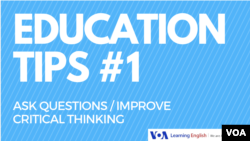In the Education Tips series, education experts in the United States give you tips about how to improve your English skills. This week, Suzanne Meyer, the assistant director at the English Language Institute at the University of Tennessee, Knoxville, discusses question-asking and the development of critical thinking skills.
For VOA Learning English, this is the Education Report.
Suzanne Meyer, the assistant director of the English Language Institute at the University of Tennessee, Knoxville, says that many students need to develop critical thinking skills.
In other words, students need to learn how to collect information, and then evaluate the information and apply it to a new context.
She says:
"We need to get students actively engaged in inquiry, from the beginning levels on, into those levels where they really are close to professional and university contexts."
One way to develop critical thinking skills, Meyer says, is to teach students to be creative about the types of questions that they ask.
Benefits of question-asking for English learners
Meyer says that there are many benefits to using question-asking activities with English learners. Question-asking activities help students to become better language learners.
She says:
"Question-asking overall helps students be better language learners. Not for the obvious, because you ask a question you get an answer. Often, questions are the first point of contact. And so if my question is not good, then that's going to direct the level of our conversation."
Meyer also says that question-asking may help develop critical thinking skills by allowing for more interactions:
"People who can ask questions are very confident. And when you are confident, you can have more interaction. That extra interaction might lead to critical thinking. Because you are more likely to actually integrate in some fashion into a new setting if you are in an ESL scenario. So, I think overall, just the whole question-asking idea has so many benefits."
How can you practice asking questions?
There are many strategies to improve question-asking and develop critical thinking skills. One possible strategy, says Meyer, is to use question-asking patterns that start with concrete questions and move to abstract questions.
SOURCE: SUZANNE MEYER
So, for example, if students were reading a new text, they would design a series of questions using three different steps.
- In the first step, students create questions about information in the text that they are reading.
- In the second step, students create questions about how the information in the text connects to their own life.
- In the third step, students create questions about abstract ideas – ideas that came up in the questions about themselves.
If students follow these three steps, they have not only practiced creative ways to ask questions, they have also started practicing critical thinking.
Example of a question-asking activity
Meyer gave an example of what this activity could look like:
SOURCE: SUZANNE MEYER/Text is from Zwier, Lawrence J. “Fat for Brains.” Inside Reading 2. 2nd ed. Ed. Cheryl Boyd Zimmerman. Oxford: OUP, 2012.
In the activity, students read part of a story. In this case, the story is about how different foods affect a person.
- In the first column there are questions about information in the text. One example of a question is this: How can food help a person's performance?
- In the second column, there are questions about how the information in the story connects to students' lives. For example,
"how do I feel and act when I don't eat well?" - In the third column, there are questions about abstract ideas that build on questions in the second column. The question "Even though people know some foods are unhealthy, why do they eat them?" is one example.
These questions, and other questions listed in the table, are examples of how to develop questions. You should, of course, create your own questions!
Practical Tips:
Meyer says that when teachers tell students which questions to answer, students are less likely to be creative about the types of questions that they ask.
So, practice developing your own questions! Try making a list of questions that go from concrete to abstract, like the steps outlined above. Check with your teacher to make sure that your grammar is correct, and try to practice in the classroom.
You can also write us your questions about this story in the comments section, or on our Facebook page. Give question-asking a try, and let us know how it works for you!
I'm John Russell.
John Russell reported this story for Learning English. Hai Do was the editor.
We want to hear from you. Write to us in the Comments Section or on our Facebook page. ________________________________________________________________
Words in This Story
critical – adj. using or involving careful judgment about the good and bad parts of something
evaluate – v. to judge the value or condition of (someone or something) in a careful and thoughtful way
context – n. the group of conditions that exist where and when something happens
inquiry – n. the act of asking questions in order to gather or collect information
benefits – n. a good or helpful result or effect
interaction – n. talking with other people
strategy – n. a careful plan or method for achieving a particular goal usually over a long period of time
concrete – adj. relating to or involving specific people, things, or actions rather than general ideas or qualities
abstract – adj. relating to or involving general ideas or qualities rather than specific people, objects, or actions






